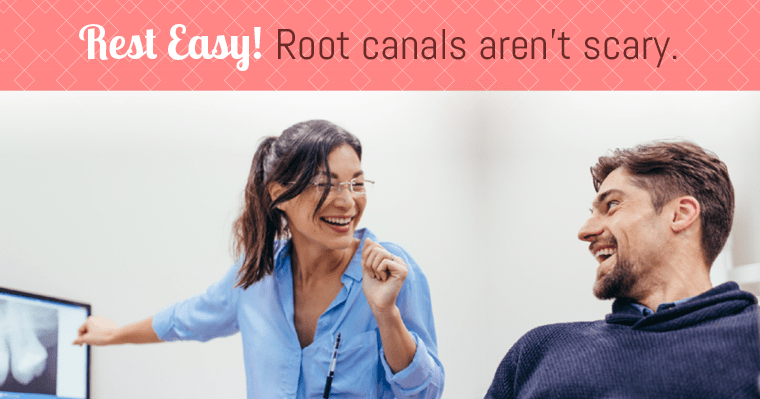5 Myths About Root Canals

Just hearing the words “root canal” can be enough to make most people cringe. The mental image of a root canal patient holding a grossly swollen jaw while groaning with pain has been perpetuated by movies, television, and cartoons. But is that the true picture of modern-day root canal treatment?
Here are five commonly believed myths about root canals and what the actual facts reveal. But first, let’s talk about why your dentist may say you need a root canal in the first place.
Why would you need a root canal?
There can be a few different reasons why your dentist will tell you that you need a root canal. The most common are:
- Cracked or damaged teeth
- Deep cavities
- An abscess
- Trauma from a previous unsuccessful treatment
When the tooth root has become inflamed or infected, this is a sign that bacteria have been able to enter through the damaged enamel. This infection leads to painful swelling and tenderness – not the root canal procedure!
Myths about root canals you may have heard
Myth #1: A root canal is painful
Root canals don’t cause pain, they relieve it! With today’s modern anesthetics and technology, a root canal is no more painful than getting a simple filling.
Your dentist will make sure you are comfortably numb and relaxed and then will remove the pain-causing infected pulp from your tooth. After it’s cleaned out, he will fill in the hole to seal out any further invading bacteria and repair the enamel of the tooth with a filling or cap the tooth with a protective crown.
Myth #2: It’s better to just have the tooth removed
A tooth extraction should always be a “last resort” treatment. Nothing functions as well as your own natural teeth, so preserving them whenever possible is always the best alternative. A root canal allows you to keep your now healthy natural tooth. This prevents you from having to resort to other dental treatments, such as bridges or implants, to fill in the gap left by an extracted tooth.
Myth #3: You only need a root canal if your tooth hurts
Sometimes a tooth’s root infection has become so severe that the tooth actually dies. You may no longer be feeling any pain but infection is still present and damaging your underlying bone structure. Even at this point, a root canal can still save the tooth structure itself. Routine dental exams are important to detect any sign of tooth infection and deal with it before it becomes painful and damaging.

Myth #4: Root canals take many visits to complete
Most root canals can be completed in just a couple of hours. If there is no serious infection they can usually be finished in one appointment or you may have to return to complete the filling or crown procedure. The condition of your tooth and the severity of infection dictate the treatment time needed.
Myth #5: Infections are common after a root canal
A re-infection of the tooth root can happen, but it is not common. If infection returns, further treatment will be needed. The newest dental materials used to pack a tooth after a root canal have been specifically designed to significantly reduce the likelihood of re-infection.
Fact: root canals are nothing to fear!
Hopefully, knowing the truth about these misconceptions will make you feel more confident the next time your dentist says the words “root canal.” This procedure can save your tooth and protect the health of the surrounding bone and teeth in just one or two painless visits to your dentist. That’s fabulous!
If you do feel any apprehension or dental-anxiety, don’t be afraid to discuss it with your dental team. Many dental offices have relaxation-inducing amenities or sedation dentistry options that will assure you of an anxiety-free visit.
Re-posted with permission: Source.
The content on this blog is not intended to be a substitute for professional medical advice, diagnosis, or treatment. Always seek the advice of qualified health providers with questions you may have regarding medical conditions.


